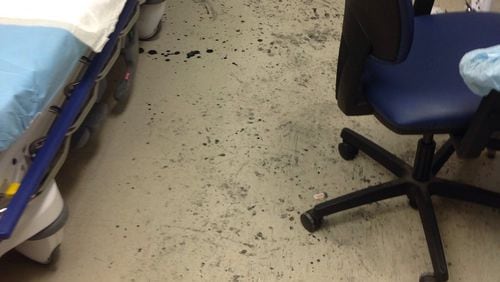The warden who has been in charge at Augusta State Medical Prison for the last 18 months has been reassigned, a signal that state corrections officials want new leadership at the facility as it deals with the sanitation and safety concerns recently brought to light by The Atlanta Journal-Constitution.
Georgia Department of Corrections spokeswoman Joan Heath confirmed Tuesday that at the end of the month, Scott Wilkes will move from the Grovetown facility to the Augusta Transitional Center, which he directed before he was promoted to his current position in July 2016. Wilkes is being reassigned because “he has been very successful in leading transitional and reentry efforts previously,” Heath wrote.
Wilkes’ replacement will be Ted Philbin, who was the warden at Autry State Prison in Pelham before recently being tasked with developing plans for the opening of the Metro Reentry Prison, Heath said. The Department of Corrections wants Philbin at Augusta State Medical Prison because it believes he is “a good fit for ASMP at this time,” she said.
Wilkes, who is in his 17th year with the department, did not respond to a phone and email messages seeking comment for this story.
Augusta State Medical Prison, the flagship of Georgia’s state prison healthcare system, includes both a 55-bed hospital and a close security prison that can house more than 1,300 men. Responsibility for the 34-year-old facility is essentially shared by the Department of Corrections and Georgia Correctional HealthCare, the branch of Augusta University contracted by the GDC to provide medical services.
Wilkes' stewardship of the facility has been subject to scrutiny since stories in the AJC revealed how the operating room and other areas have been allowed to fall into disrepair, creating a breeding ground for infection.
Photos, emails and other documents obtained by the newspaper have exposed a littany of problems: bags of trash stored outside the operating room for months, drawing flies and mosquitoes into the OR; leaking ceilings going unrepaired for years, leading to the growth of so-called black mold; a water-damaged sink near the OR littered with dirt, air vents coated with dust and other debris.
The AJC also obtained letters and emails from two inmates in which they described broken showers and toilets in the crowded dormitories where they were required to recover after surgery. Both inmates said they would resist further cancer treatment unless they could receive it elsewhere.
In addition, emails obtained by the AJC last week from Augusta University in response to an open records request indicate that several nurses have quit in recent months because they feared for their safety.
In one of the emails, Georgia Correctional HealthCare administrator Lynn Bill wrote to Randy Sauls, the Department of Corrections’ assistant commissioner for health services, to complain about an incident that occurred in the facility’s Crisis Stabilization Unit.
“One nurse resigned on the spot and two others plan to resign,” Bill wrote on Aug. 24. “If we do not get the safety issues contained at ASMP we will continue to lose staff at an aggressive pace which will affect our ability to provide coverage and thus healthcare.”
A similar feeling was conveyed in an Aug. 30 email to officials with Georgia Correctional HealthCare from the regional director for the company that runs the ASMP dialysis unit. According to Claudette Porter of CharDonnay Dialysis Inc., two nurses quit after only 30 days on the job — one because she was “afraid to work at the facility” and the other because she “was in fear for her life.”
Porter wrote that she had spoken to “various administrators at the facility on numerous occasions” during the previous six months, yet nothing substantive had been done.
“A collaborative … plan of action is decided upon and implemented; but lack of consistency is soon noted by staff and inmates,” she wrote.
Officials put an end to the practice of storing bags of trash outside the operating room after the AJC exposed the problem in October. However, it remains unclear what’s being done about the more substantial issues. That’s because officials were directed by Dr. Sharon Lewis, the Department of Corrections’ statewide medical director, to stop putting anything in writing after the AJC used public records to detail the hospital conditions.
About the Author








